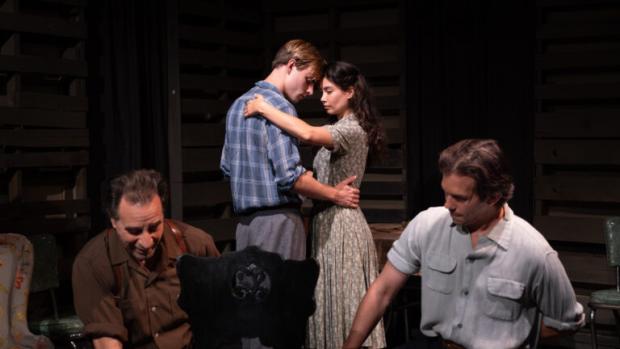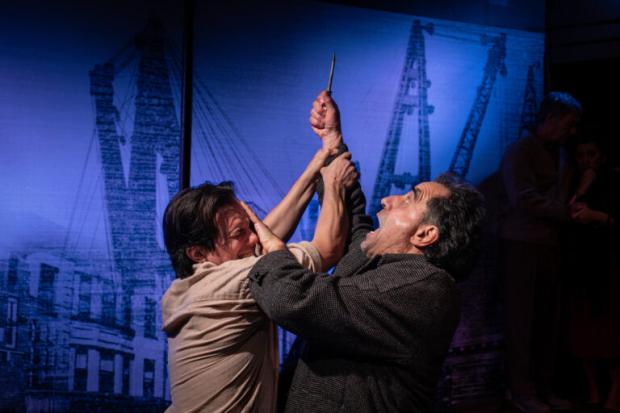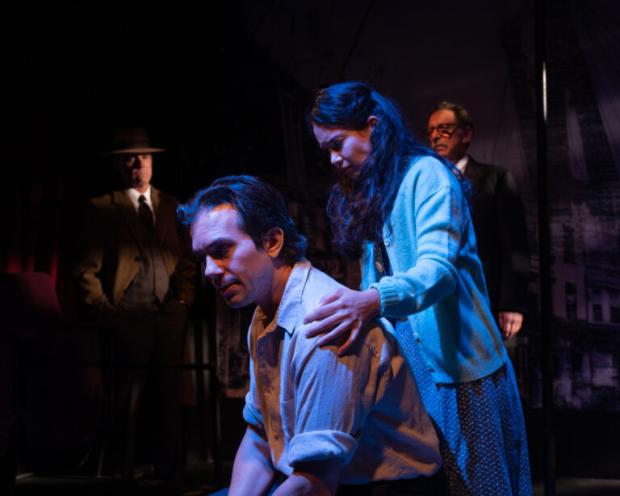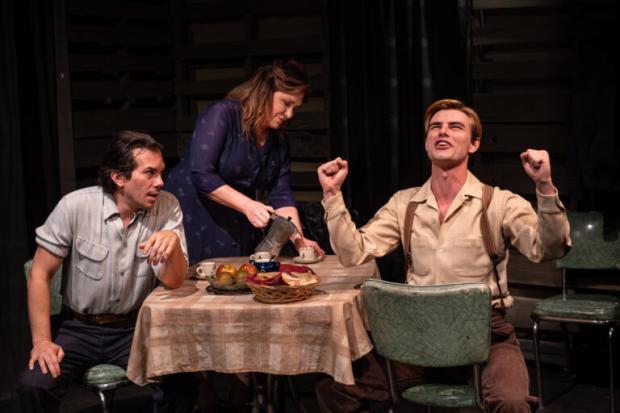Advertisement
Backstage at Carnegie Hall during the mid-1980s I found myself standing next to a tall, older gentleman. Looking up, I gasped, realizing I was in the presence of arguably the world’s greatest living playwright. I blurted out: “God bless you, Mr. Miller!”
Arthur Miller, author of the immortal masterpiece Death of a Salesman, is high up on my list of must-see bards. Whenever I get word that one of his plays is being mounted on L.A.’s boards, for me “It’s Miller time!” and I make a beeline to that stage to bask in the brilliance of his Arthurian dramatics and wordplay. (See: https://hollywoodprogressive.com/stage/all-my-sons; https://www.peoplesworld.org/article/broken-glass-what-it-means-to-be-a-jew-in-america/.) And so it was with the Ruskin Group Theatre’s stellar, gut-punching production of A View from the Bridge (which I’d never had the opportunity to see before on stage or screen) way down yonder at Santa Monica – and I wasn’t disappointed.
In fact, quite the opposite. Ray Abruzzo leads a cast in one of the best-acted dramas I’ve seen in the theater in many moons. Abruzzo portrays Eddie Carbone, who is, along with Salesman’s Willie Loman and The Crucible’s John Proctor, one of Miller’s most memorable, indelible protagonists, and Abruzzo does justice to the role he incarnates. Set in gritty, working class post-WWII New York City, Carbone is a longshoreman in Red Hook, a (then) Italian-American neighborhood near the Brooklyn Bridge.
The hard-working Carbone brings home the bacon, providing for his wife Beatrice (Kim Chase, a veteran thesp who has appeared onscreen opposite Burt Reynolds, Rod Steiger, John Savage, Robert Morse) and her late sister’s orphaned daughter, Catherine (Aurora Leonard, whose credits include TV’s New Amsterdam, Fosse/Verdon, Luke Cage), who is on the verge of womanhood. Two of Beatrice’s relatives from the mother country, Rudulpho (Brandon Lill) and his older brother Marco (Jesse Janzen, who has at least 27 screen credits, including the lead in 2020’s The Other Girl ), who are undocumented Italian immigrants, slip into the country and come to live with the trio in their hardscrabble apartment.
When sparks fly between the handsome Rudulpho and the coming-of-age Catherine, things get too hot to handle for the increasingly untethered Carbone (a name which can be a sexual doble entendre). The psychological, emotional intensity of the story and characterizations are strongly reminiscent of Tennessee Williams’ oeuvre. Indeed, when Carbone dons a T-shirt, I thought of Stanley Kowalski.
Without revealing plot spoilers, Bridge is a searing exploration of troubled family dynamics, incestuous urges and repressed homosexuality, betrayal, as well as a dramatization of the plight of “illegal” immigrants and U.S. Customs – except in those pre- I.C.E. days, the “aliens” were Caucasian Europeans, Italians fleeing a post-Mussolini Italy where jobs are hard to come by, and America beckons as that mythical land of opportunity, where the streets are paved with gold. As usual, Miller sides with the underdog (although I couldn’t help but wonder if the dramatist had been criticized for his portrayal of Italian-Americans and Italians?).
Boiling beneath Bridge’s surface is, as usual for a Miller play, a political subtext. Miller’s proletarian/psychological drama was written over a period of time in the 1950s, during the Red Scare. After refusing to become an informer, Miller himself was blacklisted after testifying before the House Un-American Activities Committee; he was found guilty of contempt of Congress, fined, given a prison sentence and was denied a U.S. passport. Instead of snitching, Miller had rather heroically told HUAC: “I could not use the name of another person and bring trouble on him” in order to save himself.
Unlike Miller’s onetime friend, director Elia Kazan, who became, as Navasky notes in his book Naming Names, “the quintessential informer.” Kazan went on to justify informing in the 1954 movie On the Waterfront, wherein Marlon Brando played the informer Terry Malloy, who is, interestingly, like Eddie Carbone a longshoreman. But Miller doesn’t rationalize informing, and the tragedy’s most hair-raising dialogue is when one of the characters denounces the traitor: “He’s a rat! He belongs in the sewer!... He bites people when they sleep! He comes when nobody’s looking.”
Of course, this is the moral Miller’s denunciation of the Blacklist and those who collaborate with it. In particular, one senses that the outraged Miller was accusing his old friend and colleague Kazan, who the playwright parted ways with due to Kazan’s singing like a canary to HUAC.
Abruzzo (who played Little Carmine Lupertazzi on HBO’s The Sopranos) delivers a powerhouse of a performance, with mannerisms and facial expressions that reveal a man at war with himself. When awards are announced, Abruzzo deserves to be remembered. As effusive as Abruzzo is, Aurora Leonard depicts Catherine in a subtle, subdued, soft spoken way. Her character may possess characteristics of Marilyn Monroe, especially of the teenaged bride Norma Jean; Miller was married to Marilyn for about five years. Catherine is also divided within herself, torn apart by her gratitude to Eddie, who helped raise her, but is also stifling her as the young beauty’s sexuality blossoms. Anguished but wronged, will this worm ever turn?
Kim Chase’s worldly-wise Beatrice senses her husband’s inner turmoil and despite her lack of formal education, understands what seems to be going on. A genuinely good person, she is put on the horns of a dilemma as Bea, too, is caught between Eddie, her kinfolk and her own self-interest as a housewife reliant on her husband, the breadwinner. Brandon Lill also stands out as Rudulpho, the laborer from Italy hellbent on bettering himself in America, and who may be a little too talented and good looking for his own good, as Eddie projects his own conflicts on him. The entire ensemble is adeptly directed by Mike Reilly in a set, with a photo mural backdrop of the Brooklyn Bridge, so intimate that theatergoers may feel like they’re in the proverbial fourth wall.
This production of Arthur Miller’s A View from the Bridge is highly recommended for grown up, mature audiences who like their drama mounted with the gloves off and unabridged, love top notch acting and writing, and are concerned with immigration issues and gay themes. And after finally being able to catch and watch Bridge, which had eluded me for decades, I can honestly say it was worth the wait and: “May Jesus, Yahweh, Allah, Buddha, Zarathustra, Odin, Zeus, Madame Pele, Krishna and God bless you, Mr. Miller!”
A View from the Bridge is being presented until October 8 at 8:00 p.m. on Fridays and Saturdays, and 2:00 p.m. on Sundays at Ruskin Group Theatre, 3000 Airport Avenue, Santa Monica, CA 90405. For reservations http://www.ruskingrouptheatre.com or call (310)397-3244.




